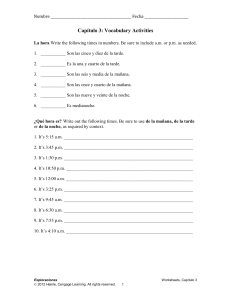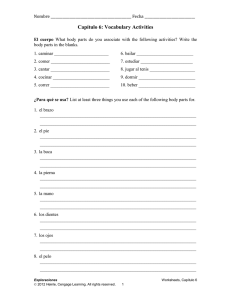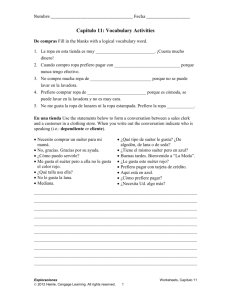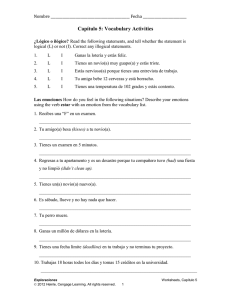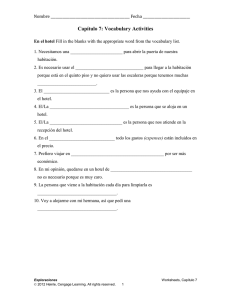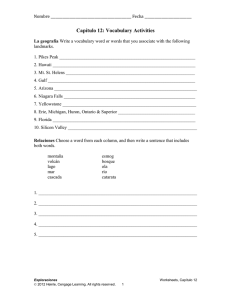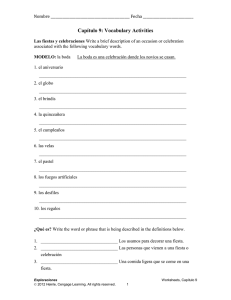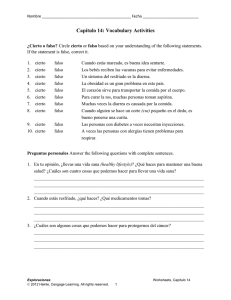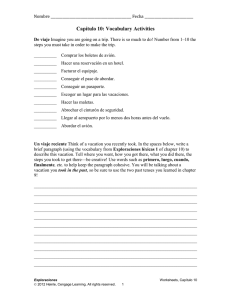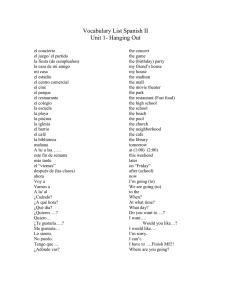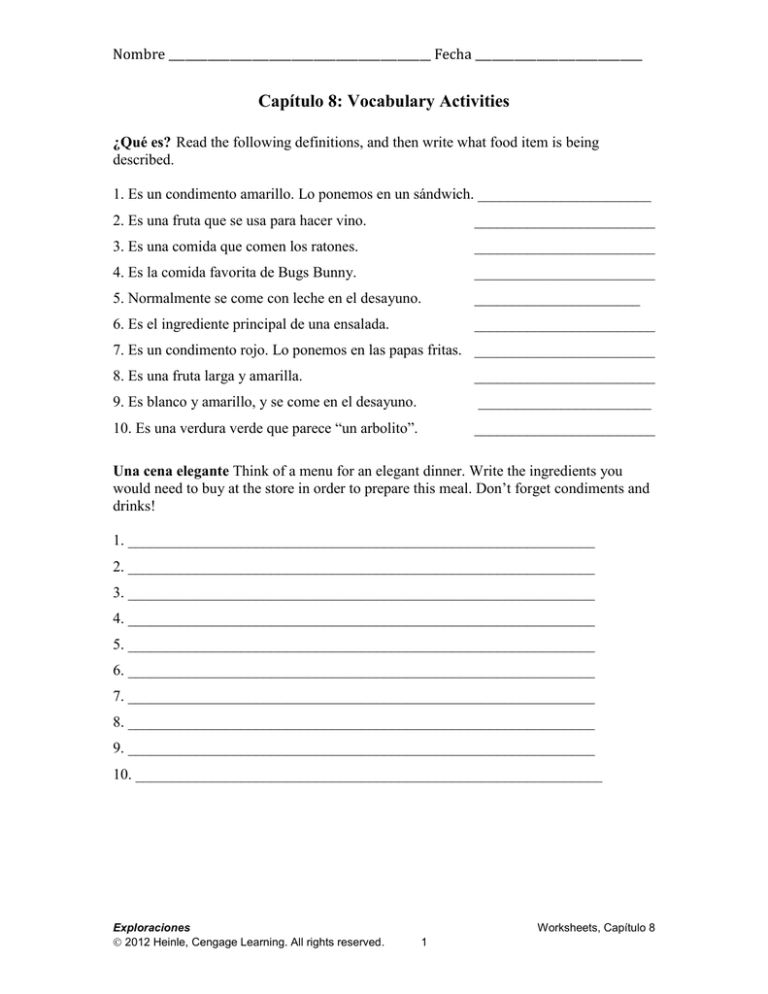
Nombre _______________________________________________ Fecha ______________________________
Capítulo 8: Vocabulary Activities
¿Qué es? Read the following definitions, and then write what food item is being
described.
1. Es un condimento amarillo. Lo ponemos en un sándwich. _______________________
2. Es una fruta que se usa para hacer vino.
________________________
3. Es una comida que comen los ratones.
________________________
4. Es la comida favorita de Bugs Bunny.
________________________
5. Normalmente se come con leche en el desayuno.
______________________
6. Es el ingrediente principal de una ensalada.
________________________
7. Es un condimento rojo. Lo ponemos en las papas fritas. ________________________
8. Es una fruta larga y amarilla.
________________________
9. Es blanco y amarillo, y se come en el desayuno.
_______________________
10. Es una verdura verde que parece “un arbolito”.
________________________
Una cena elegante Think of a menu for an elegant dinner. Write the ingredients you
would need to buy at the store in order to prepare this meal. Don’t forget condiments and
drinks!
1. ______________________________________________________________
2. ______________________________________________________________
3. ______________________________________________________________
4. ______________________________________________________________
5. ______________________________________________________________
6. ______________________________________________________________
7. ______________________________________________________________
8. ______________________________________________________________
9. ______________________________________________________________
10. ______________________________________________________________
Exploraciones
2012 Heinle, Cengage Learning. All rights reserved.
Worksheets, Capítulo 8
1
Nombre _______________________________________________ Fecha ______________________________
El tiempo libre What activities can you do in the following situations? Try to mention at
least two activities for each situation.
1. Quieres estar afuera.
______________________________________________________________________
2. Necesitas hacer un poquito de ejercicio.
______________________________________________________________________
3. Estás aburrido(a).
______________________________________________________________________
4. Estás cuidando a dos niños pequeños.
______________________________________________________________________
5. Hace mucho frío.
______________________________________________________________________
Preguntas personales Answer the following questions with complete sentences.
1. ¿Practicas algún deporte? ¿Qué deporte practicas?
______________________________________________________________________
______________________________________________________________________
2. ¿Qué haces cuando hace mucho calor?
______________________________________________________________________
3. ¿Qué te gusta hacer cuando vas de vacaciones?
______________________________________________________________________
______________________________________________________________________
4. ¿Tocas algún instrumento? ¿Cuál?
______________________________________________________________________
______________________________________________________________________
5. ¿Qué haces en tu tiempo libre?
______________________________________________________________________
______________________________________________________________________
6. ¿Tienes otros pasatiempos? ¿Cuáles son?
______________________________________________________________________
______________________________________________________________________
Exploraciones
2012 Heinle, Cengage Learning. All rights reserved.
Worksheets, Capítulo 8
2
Nombre _______________________________________________ Fecha ______________________________
Capítulo 8: Grammar Activities
Mi receta (recipe) favorita Put the following steps in the correct order to make a cake;
number them from 1 through 8.
Receta para hacer un pastel de chocolate:
_____ Se pone el pastel en el horno.
_____ Se compran todos los ingredientes para el pastel.
_____ Se va al supermercado.
_____ Se ponen los huevos en el tazón.
_____ Se sirve con helado.
_____ Se prende el horno.
_____ Se baten todos los ingredientes.
_____ Se hornea por 45 minutos.
Tu receta favorita Using the impersonal se, tell what steps you take to make your
favorite recipe. Follow the format from the previous activity.
Una receta para hacer _____________________________________________________
________________________________________________________________________
________________________________________________________________________
________________________________________________________________________
________________________________________________________________________
________________________________________________________________________
________________________________________________________________________
________________________________________________________________________
________________________________________________________________________
________________________________________________________________________
________________________________________________________________________
Exploraciones
2012 Heinle, Cengage Learning. All rights reserved.
Worksheets, Capítulo 8
3
Nombre _______________________________________________ Fecha ______________________________
Complementos indirectos Fill in the blanks with the correct indirect object pronoun.
1. Siempre _____ escribo cartas a mis amigos.
2. Cuando mis amigos _____ piden dinero, no ______ puedo dar nada porque ¡soy
pobre!
3. En los restaurantes, yo siempre _____ doy una buena propina al mesero.
4. A veces los jóvenes no _____ dicen la verdad a sus padres.
5. Es buena idea pedir_____ consejos a un buen amigo cuando necesitas ayuda.
6. La profesora de español _____ da mucha tarea (a nosotros) este semestre.
7. Siempre _____ doy un regalo de cumpleaños a mi madre.
8. Los estudiantes nunca _____ dan un regalo de cumpleaños a su profesora.
9. En el restaurante, la mesera _____ sirve las bebidas a sus clientes.
10. Los padres siempre _____ mandan dinero a sus hijos en la universidad.
Más complementos indirectos Fill in the blanks with the most logical indirect object
pronoun and verb in the present tense to complete each sentence.
mandar
traer
dar
decir
pedir
hacer
prestar
1. Mi madre _____ ____________________ galletas por correo a mi hermano.
2. Mi esposo _____ ____________________ el desayuno a la cama cuando estoy
enferma.
3. Los estudiantes _____ ____________________ muchas preguntas a la profesora.
4. Mi primo _____ ____________________ su coche cuando el mío (mine) no
funciona.
5. Los niños _____ ____________________ invitaciones para su fiesta de cumpleaños a
sus amigos.
6. A veces los jóvenes _____ ____________________ mentiras a sus padres.
7. Los clientes _____ ____________________ la cuenta al mesero.
Exploraciones
2012 Heinle, Cengage Learning. All rights reserved.
Worksheets, Capítulo 8
4
Nombre _______________________________________________ Fecha ______________________________
Verbos como gustar Form logical sentences combining elements from each of the three
columns. Remember to follow the verb construction like gustar.
Penélope Cruz
Oprah Winfrey
Christina Aguilera
LeBron James
Ricky Martin y Shakira
El presidente Obama
bailar
los zapatos caros
los bailes latinos
el básquetbol
la política
las películas independientes
encantar
+ (no) + gustar +
interesar
1. ______________________________________________________________________
2. ______________________________________________________________________
3. ______________________________________________________________________
4. ______________________________________________________________________
5. ______________________________________________________________________
6. ______________________________________________________________________
El imperfecto Julia is always thinking about her daughter, Alicia, and describes her
actions below. Then, Julia’s mother says that Julia used to be quite the same when she
was a child! Read the paragraph below, and then re-write the paragraph to tell what Julia
was like.
Alicia es una chica muy artística. Siempre hace algo creativo y le gusta jugar afuera
también. Juega muchos deportes y es muy atlética también. Practica el tenis todos los días
después de la escuela y cuando está oscuro (dark) viene a la casa y lee antes de cenar.
Después de cenar, va a su dormitorio, se ducha y se pone el pijama. Se acuesta a las 9:30
de la noche. Lee un rato y se duerme a las 10:00. ¡Alicia es una hija extraordinaria!
Julia también (1) _______________________ una chica muy artística. Siempre (2)
_______________________ algo creativo y (3) _______________________ jugar afuera
también. (4) _______________________ muchos deportes y (5)
_______________________ muy atlética también. (6) _______________________ el
tenis todos los días después de la escuela y cuando (7) _______________________
oscuro (dark) (8) _______________________ a la casa y (9)
_______________________ antes de la cena. Después de la cena (10)
_______________________ a su dormitorio, (11) _______________________ y (12)
_______________________ el pijama. (13) _______________________ a las 9:30 de la
Exploraciones
2012 Heinle, Cengage Learning. All rights reserved.
Worksheets, Capítulo 8
5
Nombre _______________________________________________ Fecha ______________________________
noche. (14) _______________________ un rato y (15) _______________________ a las
10:00. ¡Julia también (16) _______________________ una hija extraordinaria!
Cuando era niño(a)… Think about what you used to do at different ages when you were
a child. What did you eat? What TV shows did you watch? What did you do in your free
time? What were your pastimes? What did you do with other people (such as parents,
family members, and friends)? In the blanks below, tell as much about what you did at
the different ages given. Be creative!
1. Cuando tenía 2 años…
_____________________________________________________________________
_____________________________________________________________________
2. Cuando tenía 5 años…
_____________________________________________________________________
_____________________________________________________________________
3. Cuando tenía 10 años…
_____________________________________________________________________
_____________________________________________________________________
4. Cuando tenía 13 años…
_____________________________________________________________________
_____________________________________________________________________
5.
Cuando tenía 17 años…
_____________________________________________________________________
_____________________________________________________________________
Exploraciones
2012 Heinle, Cengage Learning. All rights reserved.
Worksheets, Capítulo 8
6
Nombre _______________________________________________ Fecha ______________________________
Submarino This game is played like Battleship. Each player draws 5 “battleships” in 5
different spaces on the grid below. (Don’t let your partner see where you have placed
your ships!) You try to sink your partner’s ships by asking questions about what the
different people did as a child (de niño/a). Be sure to use the imperfect tense!
Tú:
¿Eduardo coleccionaba monedas?
Tu compañero: Sí, Eduardo coleccionaba monedas. (If you have a ship in that square.) /
No, Eduardo no coleccionaba monedas. (If you don’t.)
coleccionar
monedas
(coins)
saltar la cuerda
leer las tiras
cómicas
jugar ajedrez
Eduardo
Jaime y Elena
tú
ustedes
Pronombres de complemento directo e indirecto In each sentence below, underline the
verb, then draw a box around the direct object and a squiggly line around the indirect
object.
1. Los estudiantes nunca les dan regalos a sus profesores.
2. Mi esposo me da flores en nuestro aniversario.
Exploraciones
2012 Heinle, Cengage Learning. All rights reserved.
Worksheets, Capítulo 8
7
Nombre _______________________________________________ Fecha ______________________________
3. Siempre te presto dinero.
4. Los niños siempre les dan dibujos interesantes a sus padres.
5. Los estudiantes les piden consejos a sus consejeros.
Más práctica con los pronombres Write six sentences (without replacing the direct
object with a pronoun) using words from each column. THEN, re-write the sentences
using double object pronouns. You can use different words if you would like to make
more interesting sentences—the lists are simply a guide. Be
creative!
el médico
el profesor
mis amigos
los estudiantes
el abogado
el consejero
los padres
comprar
dar
escribir
pedir
decir
prestar
mandar
regalos
tarea
mentiras
consejos
medicina
dinero
cartas
sus clientes
su paciente
los estudiantes
el/la profesor(a)
su amigo
compañero
los hijos
1. ______________________________________________________________________
2. ______________________________________________________________________
3. ______________________________________________________________________
4. ______________________________________________________________________
5. ______________________________________________________________________
6. ______________________________________________________________________
Exploraciones
2012 Heinle, Cengage Learning. All rights reserved.
Worksheets, Capítulo 8
8
Nombre _______________________________________________ Fecha ______________________________
Preguntas personales Answer the following questions with complete sentences. Make
sure you replace BOTH the direct and indirect objects with their corresponding pronouns!
1. ¿Le mandas flores a tu mamá en su cumpleaños?
_____________________________________________________________________
_____________________________________________________________________
2. ¿Les dices mentiras a tus padres a veces?
_____________________________________________________________________
_____________________________________________________________________
3. ¿Siempre les das la tarea a tus profesores a tiempo?
_____________________________________________________________________
_____________________________________________________________________
4. ¿A veces le mandas regalos a un amigo que vive lejos de ti?
_____________________________________________________________________
_____________________________________________________________________
5. ¿Le das consejos a un amigo que tiene problemas?
_____________________________________________________________________
_____________________________________________________________________
Exploraciones
2012 Heinle, Cengage Learning. All rights reserved.
Worksheets, Capítulo 8
9

